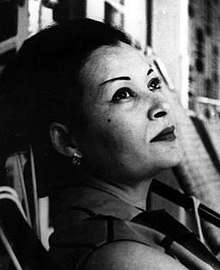Marie Vieux Chauvet
| Marie Vieux-Chauvet | |
|---|---|
 Vieux-Chauvet, Port-au-Prince 1963 | |
| Born |
September 16, 1916 Port-au-Prince, Haiti |
| Died |
June 19, 1973 New York City |
| Pen name | Colibri |
| Occupation | Writer |
| Nationality | Haitian |
| Period | 1947–73 |
| Genre | Novels, plays, short stories |
| Spouses | Dr. Aymon Charlier, Pierre Chauvet |
| Relatives | Constant Vieux (Father), Delia Nones (Mother) |
Marie Vieux-Chauvet (September 16, 1916 – June 19, 1973)[1] was a Haitian novelist, poet and playwright. Born and educated in Port-au-Prince, she is most famous works for the novels Fille d'Haïti (1954), La Danse sur le Volcan (1957), Fonds des Nègres (1961), and Amour, Colère, Folie (1969).[2] She was also published under her maiden name, Marie Vieux.
Family history
Marie Vieux-Chauvet was born in Port-au-Prince, Haiti, on September 16, 1916, to Constant Vieux, a Haitian politician, and his wife Delia Nones, a woman originally from the Virgin Islands.[3] Marie completed her studies at the l'Annexe de l'École Normale d'Institutrices and obtained a degree in elementary education in 1933.[3] She married Aymon Charlier, a doctor, then divorced him. She later married Pierre Chauvet, a travel agent.[3]
Work
Vieux-Chauvet's works focus on class, race, women, family structure and the upheaval of Haitian political, economic and social society during the United States occupation of Haiti[4] and dictatorship of François Duvalier. Although she lived under heavy surveillance during Duvalier's dictatorship, Vieux-Chauvet persisted as a writer, hosting meetings of the Les Araignées du Soir (Evening Spiders), a group of poets and writers of which she was the only female.
Vieux-Chauvet sent a trilogy of novellas to France to be published as a single book titled Amour, Colère, Folie (Love, Anger, Madness).[5] The trilogy Amour, Colère, Folie was published in 1968 by the prestigious publishing house Gallimard in Paris[2] with the support of Simone de Beauvoir. The trilogy was perceived as an attack on the Haitian dictator François Duvalier.[2] Fearing the dictator's legions of Tonton Macoutes, her husband bought all the copies of the book he could find in Haiti,[2] and Vieux-Chauvet's daughters bought the remaining copies from Gallimard a few years later.
She moved to New York City, where she worked as a housekeeper, and she remarried. She died of brain cancer in the United States on June 19, 1973.
Extracts from her work appear in the anthologies Her True-True Name[6] and Daughters of Africa.[7] An English translation of Amour, Colère, Folie (Love, Anger, Madness) by Rose-Myriam Réjouis and Val Vinokur was published in 2009 with an introduction by Haitian-American writer Edwige Danticat.
Literary awards
Bibliography
Novels
- Fille d'Haïti (Paris: Fasquelle, 1954; Paris: Zellige, 2014)[3]
- La Danse sur le Volcan (Paris: Plon, 1957; Paris / Léchelle: Maisonneuve & Larose / Emina Soleil, 2004 (reprint with a preface by Catherine Hermary-Vieille); Léchelle: Zellige, 2008, 2009)[3] Translated into English by Salvator Attanasio as Dance on the Volcano (New York: William Sloane Associates, 1959)
- Fonds des Nègres (Port-au-Prince: Henri Deschamps, 1960)[3]
- Amour, Colère et Folie (Paris: Gallimard, 1968; Paris / Léchelle: Maisonneuve & Larose / Emina Soleil, 2005; Léchelle: Zellige, 2007, 2011; Paris: Zulma, 2015)[3]
- Les Rapaces (Port-au-Prince: Deschamps, 1986)[3]
Plays
- La Légende des Fleurs (Port-au-Prince: Henri Deschamps, 1947; Port-au-Prince: Éditions Marie Vieux, 2009)[3]
- Samba (produced around 1948 in Port-au-Prince. Unpublished)[3]
- Amour, Colère et Folie (adapted by José Pliya, Paris: Avant-Scène Théâtre, 2008). Amour was produced by Vincent Goethals, with Magali Comeau-Denis (Claire) and Cyril Viallon (dancer) and performed at L'Artchipel in Guadeloupe in 2008; Colère was produced by François Rancillac, with Nicole Dogué (Laura), at L'Artchipel in October 2008; Folie was produced by José Exélis in October 2009 at L'Artchipel.[3]
Short story
- 'Ti-Moune nan Bois (Optique 7. September 1954: 57-60)[3]
References
- ↑ "Chauvet, Marie". id.loc.gov. The Library of Congress. Retrieved 2018-05-14.
- 1 2 3 4 Smarth Bell, Madison (January 14, 2010). "Permanent Exile: On Marie Vieux-Chauvet". The Nation. Retrieved March 14, 2015.
- 1 2 3 4 5 6 7 8 9 10 11 12 13 14 15 Vitiello, Joelle. "Marie Chauvet". Île en Île. Retrieved March 14, 2015.
- ↑ "U.S. Department of State, Office of the Historian".
- ↑ Hoover, Elizabeth (August 9, 2010). "Between Squalor and Splendor: Haitian Literature and National Crisis". Sampsonia Way. City of Asylum/Pittsburgh. Retrieved October 26, 2015.
- ↑ Pamela Mordecai and Elizabeth Wilson (eds), Her True-True Name, Heinemann, 1989.
- ↑ Margaret Busby (ed.), Daughters of Africa, London: Jonathan Cape, 1992.
Further reading
- Chancy, Myriam. Framing Silence: Revolutionary Novels by Haitian Women. New Brunswick: Rutgers University Press, 1997.
- Dalleo, Raphael. Caribbean Literature and the Public Sphere: From the Plantation to the Postcolonial. Charlottesville: University of Virginia Press, 2011.
- Dash, Michael. The Other America: Caribbean Literature in a New World Context. Charlottesville: University of Virginia Press, 1998.
- Dayan, Joan. Haiti, History and the Gods. Berkeley: University of California, 1998.
- Maximilien Laroche Trois études sur Folie de Marie Chauvet, Collection Essais, Québec, GRELCA. 1984
- Schutt-Ainé, Patricia (1994). Haiti: A Basic Reference Book. Miami, Florida: Librairie Au Service de la Culture. p. 101. ISBN 0-9638599-0-0.